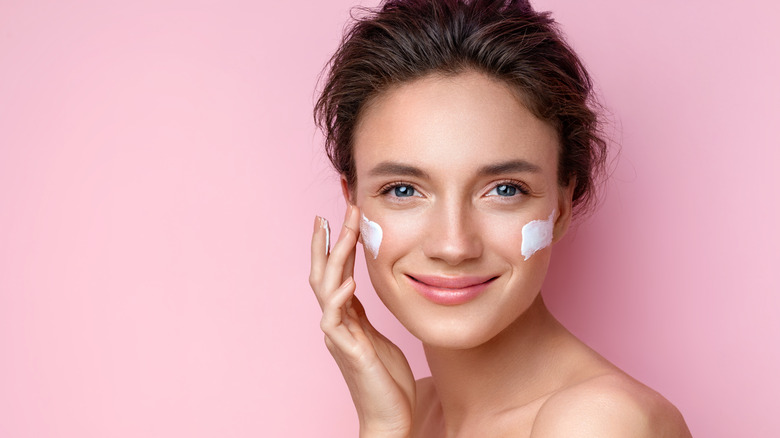Retinoid Versus Retinol: What's The Difference?
Retinoids and retinols are popular skincare products on the market today. While many are known for their antiaging benefits, certain products do much more than that. And despite their similar sounding names, they have different uses and benefits. But first, what are they? Retinoids, typically prescribed as an oral or topical medication, are chemicals derived from Vitamin A that promote skin health and treat a range of conditions like psoriasis, acne, and even cancer, via Medical News Today. These chemicals help combat aging by increasing new cell growth, and thickening the outermost layer of the skin when applied topically, via Healthline.
Retinols are a type of retinoid that can be purchased over the counter at most drug stores and supermarkets. Retinol also helps with skin cell turnover, though it's less potent and less effective than retinoids at reducing wrinkles and clearing acne, via Byrdie. Retinols generally take longer, about 6 weeks, before you start noticing the benefits. This may sound less desirable than retinoids, but some skincare experts argue there may be fewer negative side effects as a result of using retinols.
Deciding between the two
While seeking the advice of a dermatologist can be a great strategy for your skincare journey, there are considerations you can make on your own before seeking medical advice. For instance, skin sensitivity is an important factor when considering topical skincare. For those with highly sensitive skin, starting with a retinol and gradually increasing usage over time may be a great way to start, via Healthline. Another consideration is skin dryness. If your skin tends to be very dry, applying retinol 2-3 times a week is likely a good first step. Over time, your skin will build up tolerance and you can gradually work your way up in frequency and potency.
For those with more serious skincare concerns like severe acne or psoriasis, who want to see results more quickly, prescription retinoids may be the better choice. A doctor can help determine which retinoid and how often to use the product, though it's likely they'll still recommend a gradual increase over time. Similar to retinols, tolerance is built over time and because these topicals are more potent, it can be easier to overuse and experience negative side effects as a result. The most common negative side effects of retinoids are skin irritation, excessive dryness, peeling, and itching, via Medical News Today. Other side effects that occur less frequently are extreme sunlight sensitivity, discoloration, swelling, and blistering.


